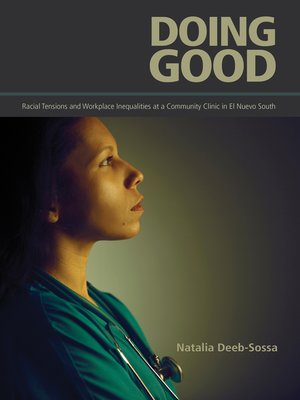Doing Good
ebook ∣ Racial Tensions and Workplace Inequalities at a Community Clinic in El Nuevo South
By Natalia Deeb-Sossa

Sign up to save your library
With an OverDrive account, you can save your favorite libraries for at-a-glance information about availability. Find out more about OverDrive accounts.
Find this title in Libby, the library reading app by OverDrive.



Search for a digital library with this title
Title found at these libraries:
| Library Name | Distance |
|---|---|
| Loading... |
Throughout the "New South," relationships based on race, class, social status, gender, and citizenship are being upended by the recent influx of Latina/o residents. Doing Good examines these issues as they play out in the microcosm of a community health center in North Carolina that previously had served mostly African American clients but now serves predominantly Latina/o clients. Drawing on eighteen months of experience as a participant- observer in the clinic and in-depth interviews with clinic staff at all levels, Natalia Deeb-Sossa provides an informative and fascinating view of how changing demographics are profoundly affecting the new social order.
Deeb-Sossa argues persuasively that "moral identities" have been constructed by clinic staff. The high-status staff—nearly all of whom are white—see themselves as heroic workers. Mid- and lower-status Latina staff feel like they are guardians of people who are especially needy and deserving of protection. In contrast, the moral identity of African American staffers had previously been established in response to serving "their people." Their response to the evolving clientele has been to create a self-image of superiority by characterizing Latina/o clients as "immoral," "lazy," "working the system," having no regard for rules or discipline, and being irresponsible parents.
All of the health-care workers want to be seen as "doing good." But they fail to see how, in constructing and maintaining their own moral identity in response to their personal views and stereotypes, they have come to treat each other and their clients in ways that contradict their ideals.
Deeb-Sossa argues persuasively that "moral identities" have been constructed by clinic staff. The high-status staff—nearly all of whom are white—see themselves as heroic workers. Mid- and lower-status Latina staff feel like they are guardians of people who are especially needy and deserving of protection. In contrast, the moral identity of African American staffers had previously been established in response to serving "their people." Their response to the evolving clientele has been to create a self-image of superiority by characterizing Latina/o clients as "immoral," "lazy," "working the system," having no regard for rules or discipline, and being irresponsible parents.
All of the health-care workers want to be seen as "doing good." But they fail to see how, in constructing and maintaining their own moral identity in response to their personal views and stereotypes, they have come to treat each other and their clients in ways that contradict their ideals.







